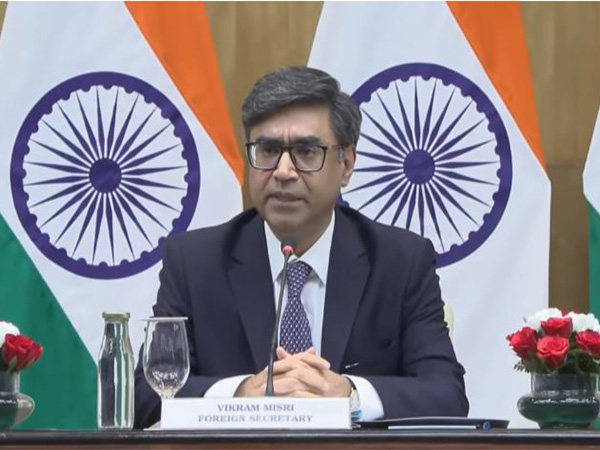Foreign Secretary Vikram Misri on Thursday exposed Pakistan’s tacit links to terror groups such as Lashkar-e-Taiba (LeT) and Jaish-e-Mohammed (JeM). During a media briefing on Operation Sindoor in New Delhi, Misri questioned why terror operatives were being given state funerals in Pakistan, often in the presence of military officials.
“It’s odd that the funerals of so-called civilians are conducted with coffins draped in Pakistani flags and state honours being accorded. As far as we are concerned, the individuals eliminated at these facilities were terrorists. Giving terrorists state funerals may be a practice in Pakistan. It doesn’t make much sense to us,” Misri told reporters.
Misri held up a photo showing Hafiz Abdul Rauf—a US-designated global terrorist and senior Lashkar-e-Taiba commander—leading funeral prayers for individuals killed in the Indian missile strikes. Rauf has been implicated in supporting LeT’s operations, including the 2008 Mumbai terror attack that killed 166 people. The U.S. Department of the Treasury designated him as a global terrorist in 2010 under Executive Order 13224 for his role in LeT’s financial and logistical networks.
“Yesterday, Pakistan launched a targeted attack on the Sikh community in Jammu & Kashmir, hitting a gurdwara in Poonch and killing three individuals. A total of 16 civilians have been killed in Poonch, and several others have been injured,” he added.
Misri further pointed out that Pakistan opposed the mention of The Resistance Front (TRF) in the United Nations Security Council (UNSC), despite the fact that TRF—a known front for LeT—had claimed responsibility for the Pahalgam terror attack not once, but twice.
“When discussions were underway at the UNSC regarding the Pahalgam attack, Pakistan opposed mentioning TRF’s role. This is despite TRF claiming responsibility twice. Colonel Qureshi and Wing Commander Singh have both clearly said that India’s response is non-escalatory, precise, and measured,” Misri said.
“Our intention is not to escalate. We are only responding to escalation. No military targets in Pakistan have been struck; only terrorist infrastructure has been targeted,” he emphasized.
The Foreign Secretary also dismissed Pakistani claims of having downed Indian fighter jets, stating that Pakistan has a long history of misinformation. “There is nothing surprising in it. After all, this is a country that started lying from the day it was born. In 1947, when the Pakistani Army claimed Jammu and Kashmir, they lied—not to any random person—but to the United Nations, saying they had nothing to do with it. This journey of falsehoods began 75 years ago.”
He warned Pakistan against any further misadventures. “Any further action by Pakistan—some of which we are seeing today—is nothing but another escalation. It is being responded to, and will continue to be responded to appropriately.”
Earlier, India’s Armed Forces neutralised an air defence system in Lahore through drone strikes. Harpy drones—designed to target radar systems—were deployed to disable Pakistan’s air defences following its attempt to target several Indian military installations on the night of May 7.
The military targets in Northern and Western India—including Awantipura, Srinagar, Jammu, Pathankot, Amritsar, Kapurthala, Jalandhar, Ludhiana, Adampur, Bhatinda, Chandigarh, Nal, Phalodi, Uttarlai, and Bhuj—were engaged by drones and missiles. These threats were successfully neutralised by India’s Integrated Counter-UAS Grid and Air Defence systems. Debris from the attacks is currently being recovered from multiple sites, confirming the Pakistani aggression.
On May 7, India launched Operation Sindoor, destroying nine terror sites deep inside Pakistan in retaliation for the Pahalgam terror attack, which claimed the lives of 26 civilians.














